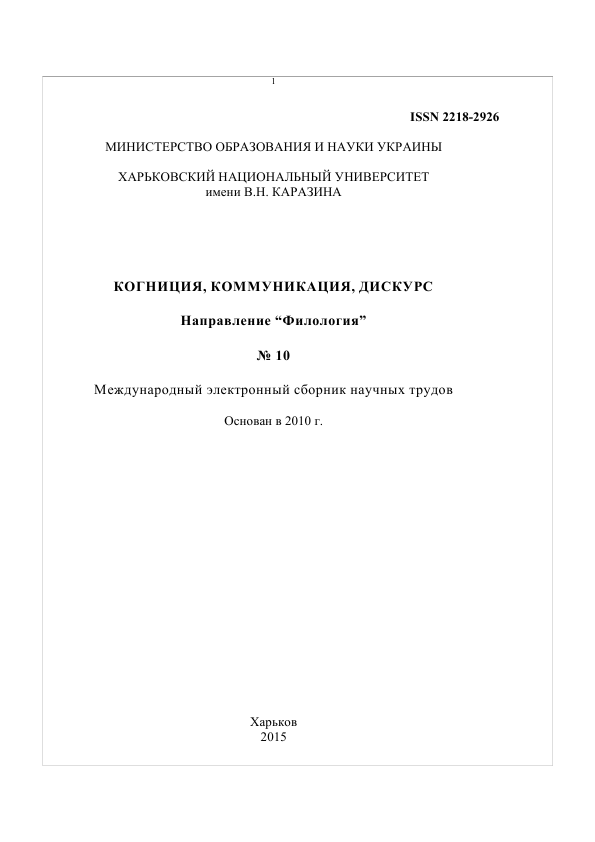Traditional rite and linguistic-cultural concept
Abstract
The present paper is focused on the genesis of the concept of the Czech «Lítost» and its relationship with the traditional Czech rite Jízda králů. The analysis is based on fiction discourse represented by the novel M. Kundera "The Joke". The author of the article proves that the traditional rite described in the novel goes back to the mythological rite of initiation – the basis of semiotics of both ceremonies is the idea of death and rebirth. The Czech concept «Lítost», denoting 'a sense of acute self-pity as the result of humiliation, which causes a reciprocal aggression’ was formed on the same semiotic basis. In the process of analyzing the main characters of the novel "The Joke" the researcher stresses the dominance of the emotion lítost in their mentality.
Downloads
References
Danilov, S. Ju. (2001). Rechevoj zhanr prorabotki v totalitarnoj kul'ture Diss. kand. filol. nauk. [Speech genre of up-bringing talks in a totalitarian culture]. Ekaterinburg. – 220 p. (in Russian).
Zaliznjak, Anna A. (2006). Mnogoznachnost' v jazyke i sposoby ee predstavlenija [The ambiguity in the language and methods of its presentation]. Moscow: Jazyki slavjanskih kul'tur Publ., 2006. (in Russian).
Zaliznjak, Anna A., and Levontina I. B., and Shmelev A. D. (2005). Kljuchevye idei russkoj jazykovoj kartiny mira [The key ideas of Russian linguistic worldview]. Moscow: Jazyki slavjanskoj kul'tury Publ. (in Russian).
Mihajlin, V. Ju. (2005). Tropa zverinyh slov [The trail of animal words]. – Moscow: Novoe literaturnoe obozrenie Publ. (in Russian).
Propp, V. Ja. (1998). Morfologija
Stepanov, Ju. S. (2001). Konstanty: Slovar' russkoj kul'tury [Constants: Dictionary of Russian culture]. The second edition. Moscow: Akademicheskij Proekt Publ. (in Russian).
Stefanski, E.E. (2008). Emocional'nye koncepty kak fragment mifologicheskoj I sovremennoj jazykovyh kartin mira (na materiale konceptov, oboznachajushhih negativnye emocii v russkoj, pol'skoj i cheshskoj lingvokul'turah) [Emotional concepts as a fragment of a mythological and contemporary linguistic worldview (based on the concepts denoting negative emotions in Russian, Polish and Czech linguistic cultures)]. Samara: SaGA Publ. (in Russian).
Stefanski, E. (2013). Roman M.Kundery «Shutka» skvoz' prizmu semiotiki obrjada «Konnica korolej» [M. Kundera's Novel “The Joke” through the Lens of Semiotics of the Rite “Kings Ride”] // Mir cheloveka na granjah jazyka – World of man on the faces of the language. Samara: SaGA Publ. – P. 39-54. (in Russian).
Slavjanskie drevnosti: Etnolingvisticheskij slovar': v 5 tomah. [Slavic Antiquities: Ethnolinguistic Dictionary] – Moscow: Mezhdunarodnye otnoshenija Publ., 1999 – 2012. (in Russian).
Etimologicheskij slovar' slavjanskih jazykov [Etymological dictionary of Slavic languages] / Ed. O.N.Trubachev. Moscow: Nauka Publ., 1980-2008. (in Russian).
Kundera, M. Kniga smeha i zabvenija [The Book of Laughter and Forgetting] / Translated by N.Shul'gina. St. Petersburg: Azbuka-klassika Publ., 2003. (in Russian).
Kundera, M. Shutka [The Joke] / Translated by N.Shul'gina. St. Petersburg: Azbuka-klassika Publ., 2003. (in Russian).
Kudera, M. Kniha smíchu a zápomnění [The Book of Laughter and Forgetti. Toronto: Sixty-Eight Publishers, 1981. (in Czech).
Kundera, M. Žert [The Joke]. Brno: Atlantis, 1996. (in Czech).
Authors, who publish with this journal, accept the following conditions:
The authors reserve the copyright of their work and transfer to the journal the right of the first publication of this work under the terms of the Creative Commons Attribution License (CC BY), which allows other persons to freely distribute a published work with mandatory reference to the authors of the original work and the first publication of the work in this journal.
Authors have the right to enter into separate additional agreements for the non-exclusive dissemination of the work in the form in which it was published by this journal (for example, to post the work in the electronic institutions' repository or to publish as part of a monograph), provided that the link to the first publication of the work in this journal is given.
The journal policy allows and encourages the authors to place the manuscripts on the Internet (for example, in the institutions' repositories or on personal websites), both before the presentation of this manuscript to the editorial board and during review procedure, as it contributes to the creation of productive scientific discussion and positively affects the efficiency and dynamics of citing the published work (see The Effect of Open Access).




